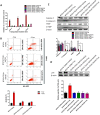YAP increases response to Trastuzumab in HER2-positive Breast Cancer by enhancing P73-induced apoptosis
- PMID: 33046997
- PMCID: PMC7545685
- DOI: 10.7150/jca.48535
YAP increases response to Trastuzumab in HER2-positive Breast Cancer by enhancing P73-induced apoptosis
Abstract
The role of the Yes-associated protein (YAP) in oncogenesis and progression of breast cancer remains controversial. Meanwhile, development of therapeutic resistance to trastuzumab, a common breast cancer treatment administered after chemotherapy, is a significant challenge in the treatment of HER2-positive breast cancer. We, therefore, analyzed the role of YAP in trastuzumab resistance in HER2-positive-breast carcinoma cells in vitro and evaluated the status of YAP and related proteins in patient-derived breast carcinoma tissues by immunohistochemistry. YAP expression was observed in both BT474-TS (trastuzumab-sensitive) and BT474-TR (trastuzumab-resistant) cells. Treatment with trastuzumab increased expression of nuclear-YAP (N-YAP) in BT474-TS cells, whereas BT474-TR cells showed a decrease in N-YAP expression following trastuzumab treatment. YAP silencing significantly reduced trastuzumab-induced inhibitory effects in BT474-TS cells. YAP-silenced cells also showed decreased apoptosis and significantly lower p73 levels following trastuzumab treatment. Combined protein kinase B (AKT) inhibitor-trastuzumab treatment significantly inhibited BT474-TR cell proliferation, resulting in increased N-YAP and p73 expression, as well as apoptosis. In both paclitaxel, doxorubicin and cyclophosphamide (TAC)-treated, and docetaxel, carboplatin, and trastuzumab (TCbH)-treated groups; the pathological complete response (pCR) ratios were inversely correlated with p-AKT status in biopsy specimens, while YAP and p73 status were positively correlated with the pCR ratio in the biopsy specimens of the TCbH group. Our results show that YAP is involved in trastuzumab resistance in HER2-positive breast carcinoma cells and that YAP and AKT may be developed as prognostic markers of neoadjuvant trastuzumab therapy in patients with HER2-positive breast cancer.
Keywords: Breast cancer; Chemotherapy; Neoadjuvant therapy; Protein kinase B/AKT; Tumor progression.
© The author(s).
Conflict of interest statement
Competing Interests: The authors have declared that no competing interest exists.
Figures




Similar articles
-
Neoadjuvant trastuzumab, pertuzumab, and chemotherapy versus trastuzumab emtansine plus pertuzumab in patients with HER2-positive breast cancer (KRISTINE): a randomised, open-label, multicentre, phase 3 trial.Lancet Oncol. 2018 Jan;19(1):115-126. doi: 10.1016/S1470-2045(17)30716-7. Epub 2017 Nov 23. Lancet Oncol. 2018. PMID: 29175149 Clinical Trial.
-
The Hippo Transducer YAP/TAZ as a Biomarker of Therapeutic Response and Prognosis in Trastuzumab-Based Neoadjuvant Therapy Treated HER2-Positive Breast Cancer Patients.Front Pharmacol. 2020 Aug 27;11:537265. doi: 10.3389/fphar.2020.537265. eCollection 2020. Front Pharmacol. 2020. PMID: 32973536 Free PMC article.
-
Trastuzumab-resistant breast cancer cells-derived tumor xenograft models exhibit distinct sensitivity to lapatinib treatment in vivo.Biol Proced Online. 2023 Jun 27;25(1):19. doi: 10.1186/s12575-023-00212-3. Biol Proced Online. 2023. PMID: 37370010 Free PMC article.
-
[Systemic treatments of inflammatory breast cancer: an overview].Bull Cancer. 2014 Dec;101(12):1080-8. doi: 10.1684/bdc.2014.2014. Bull Cancer. 2014. PMID: 25475708 Review. French.
-
Tumor-infiltrating lymphocytes in patients with HER2-positive breast cancer treated with neoadjuvant chemotherapy plus trastuzumab, lapatinib or their combination: A meta-analysis of randomized controlled trials.Cancer Treat Rev. 2017 Jun;57:8-15. doi: 10.1016/j.ctrv.2017.04.005. Epub 2017 May 2. Cancer Treat Rev. 2017. PMID: 28525810 Review.
Cited by
-
Identification and functional comparison of novel alternatively spliced isoforms of human YAP.FEBS Open Bio. 2023 Jun;13(6):1001-1014. doi: 10.1002/2211-5463.13618. Epub 2023 May 8. FEBS Open Bio. 2023. PMID: 37098971 Free PMC article.
-
YAP inhibition overcomes adaptive resistance in HER2-positive gastric cancer treated with trastuzumab via the AKT/mTOR and ERK/mTOR axis.Gastric Cancer. 2024 Jul;27(4):785-801. doi: 10.1007/s10120-024-01508-3. Epub 2024 May 23. Gastric Cancer. 2024. PMID: 38782859 Free PMC article.
-
Context-dependent roles of YAP/TAZ in stem cell fates and cancer.Cell Mol Life Sci. 2021 May;78(9):4201-4219. doi: 10.1007/s00018-021-03781-2. Epub 2021 Feb 13. Cell Mol Life Sci. 2021. PMID: 33582842 Free PMC article. Review.
-
Direct and selective pharmacological disruption of the YAP-TEAD interface by IAG933 inhibits Hippo-dependent and RAS-MAPK-altered cancers.Nat Cancer. 2024 Jul;5(7):1102-1120. doi: 10.1038/s43018-024-00754-9. Epub 2024 Apr 2. Nat Cancer. 2024. PMID: 38565920 Free PMC article.
-
Expression of yes-associated protein, β-catenin and smoothened, and their clinical significance in invasive breast cancer.Exp Ther Med. 2022 Jun;23(6):429. doi: 10.3892/etm.2022.11356. Epub 2022 May 6. Exp Ther Med. 2022. PMID: 35607374 Free PMC article.
References
-
- Abotaleb M, Kubatka P, Caprnda M, Varghese E, Zolakova B, Zubor P. et al. Chemotherapeutic agents for the treatment of metastatic breast cancer: An update. Biomedicine & pharmacotherapy = Biomedecine & pharmacotherapie. 2018;101:458–77. - PubMed
-
- Fedele C, Riccio G, Coppola C, Barbieri A, Monti MG, Arra C. et al. Comparison of preclinical cardiotoxic effects of different ErbB2 inhibitors. Breast cancer research and treatment. 2012;133:511–21. - PubMed
-
- Rimawi MF, Schiff R, Osborne CK. Targeting HER2 for the treatment of breast cancer. Annual review of medicine. 2015;66:111–28. - PubMed
LinkOut - more resources
Full Text Sources
Research Materials
Miscellaneous

